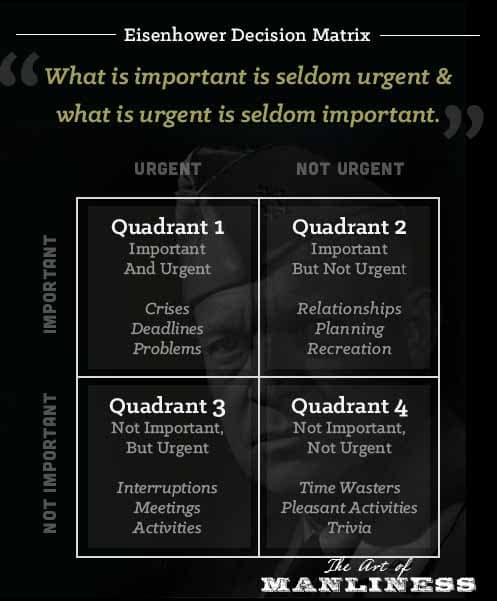A local elected official recently confused “crisis” with “important”.
 Yet a crisis is something that is both urgent and important,
and if we spend more time on things that are important and not urgent,
such as planning, we won’t have as many crises.
Instead, the corporate media and social media
would have us spend most time on interruptions that are urgent but not important
(traffic slowdowns or obstructions) or, worse, trivia that is neither urgent nor important
(which celebrities are seeing whom).
This confusion affects everything from attracting jobs to electing candidates to clean air and water.
Yet a crisis is something that is both urgent and important,
and if we spend more time on things that are important and not urgent,
such as planning, we won’t have as many crises.
Instead, the corporate media and social media
would have us spend most time on interruptions that are urgent but not important
(traffic slowdowns or obstructions) or, worse, trivia that is neither urgent nor important
(which celebrities are seeing whom).
This confusion affects everything from attracting jobs to electing candidates to clean air and water.
Dwight D. Eisenhower had a solution:
In a 1954 speech to the Second Assembly of the World Council of Churches, former U.S. President Dwight D. Eisenhower, who was quoting Dr J. Roscoe Miller, president of Northwestern University, said: “I have two kinds of problems: the urgent and the important. The urgent are not important, and the important are never urgent.” This “Eisenhower Principle” is said to be how he organized his workload and priorities.
— Eisenhower’s Urgent/Important Principle: Using Time Effectively, Not Just Efficiently by Mind Tools; see also Quote Investigator for several variant versions.
Even though it often seems to be forgotten, this has to be one of the most popular business and personal improvement methods ever, so there are plenty of graphics and explanations.

First Things First, book by Stephen Covey, 1994, described in Wikipedia
Do we really want to spend all our time putting out fires? If not, maybe we should spend more time doing fire-prevention. To help with that, maybe spend less time answering every telephone call (interruptions) or telling everyone how little time we have (time wasting).
Which is which? Well, that’s up to you. But if you spend most of your time reacting to things that weren’t foreseen, you’re probably in crisis mode too much of the time, and could use more planning. If you spend a lot of time being outraged over what you see on TV, you’re probably being manipulated with time wasters so you will buy advertised products and not pay attention to really important problems facing the country and the world.

Urgent vs Important, John Lura, Design, 3 March 2010
So how could you manage your time? Prioritize what’s important, followed by what’s urgent. If something is neither, avoid it.

Eisenhower’s Urgent/Important Principle:,
by Mind Tools
Using Time Effectively, Not Just Efficiently
How can you do that? For any task, think about: is it important? Is it urgent? If you know what tasks you need to do for a day (or week, month, year, etc.) write them down, and sort them according to urgent and important.
If you don’t know what tasks you need to do for a day, maybe you should carve out some time to figure that out, because you’re probably reacting in crisis mode instead of doing important things.
If you’re an elected official, and you keep finding agenda items that have to be voted on right now to approve funds for things you never heard about before, you may want to consider whether you’re being manipulated by your staff for the advantage of some special interest instead of representing the people who elected you. Why aren’t staff doing the important work of planning ahead so you don’t keep getting these urgent vote-right-now agenda items?
On a larger scale, state or national governments may leave important things undone because they’re just too busy dealing with near-term issues, or maybe because big money is going to their campaigns to keep them looking the other way. That can end up with huge issues becoming urgent. More on that in another post.
Important vs. urgent also applies to things like attracting jobs. Giving away tax revenue depletes funds for schools that could make a better work force that would attract better jobs with better pay. More on that later.
Remember: what is important is seldom urgent, and what is urgent is seldom important, and choosing to deal with important but not urgent items, can keep them from becoming a crisis.

The Eisenhower Decision Matrix: How to Distinguish Between Urgent and Important Tasks and Make Real Progress in Your Life,
by Brett & Kate McKay, The Art of Manliness, 23 October 2013.
Yes, that last one is from a website called The Art of Manliness. But this principle isn’t sex-linked or age-linked: it works for anybody. Paying more attention to important things leads to fewer crises.
-jsq
Short Link: